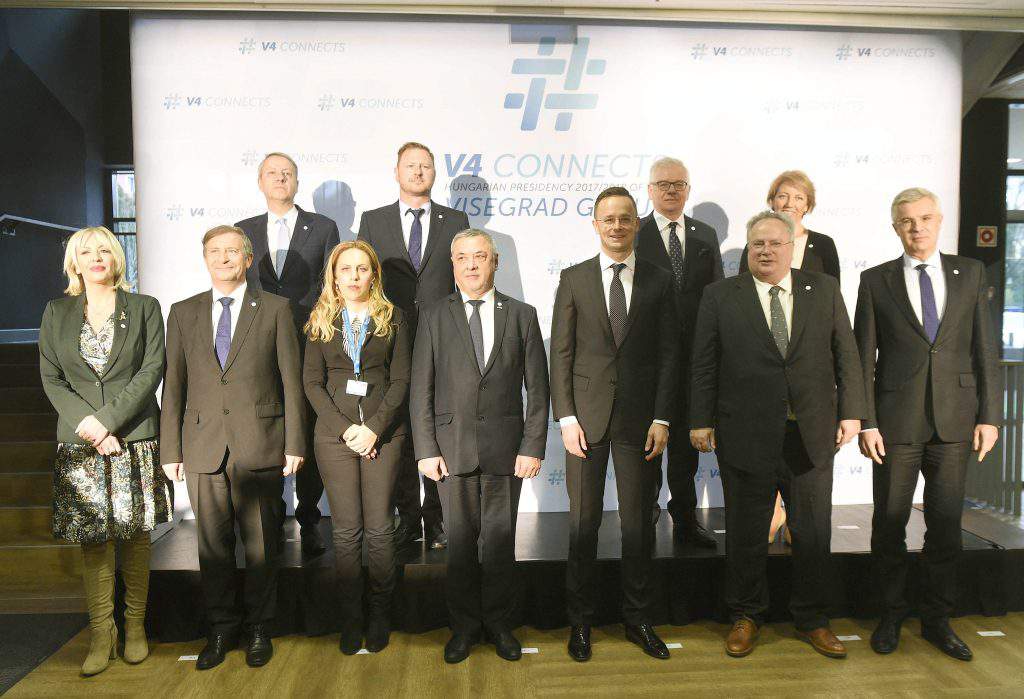V4-plus ministerial meeting focuses on EU expansion, energy security in Budapest

Ministers from the Visegrad Group plus Serbia, Slovenia, Croatia, Greece, Romania and Bulgaria agreed at a meeting in Budapest on Monday on the need to enlarge the European Union to embrace countries of the Western Balkans as well to expand the Schengen area and establish energy security.
Péter Szijjártó met ministers representing the other three countries of the Visegrad Group (Czech Republic, Poland and Slovakia) plus Bulgaria, Croatia, Greece, Serbia, Slovenia and Romania.
“We have nothing to be ashamed of when it comes to making the EU stronger,” Szijjártó told a joint press conference.
“Here in central Europe we have proved that illegal migration can be stopped,” he said.
Szijjártó added that by producing economic growth above the EU average, the region had greatly contributed to Europe’s rebound. So the region has justifiable grounds for expectations when it comes to the EU, he said, adding that these included maintaining the Schengen zone and speeding up further EU integration as well as helping to guarantee central Europe’s energy security.
The foreign minister said it is important that the Schengen zone “function normally again”, but for this to happen, the external borders needed protection and rules within the zone rules must be respected. This is essential in terms of competitiveness, he said, adding that “hobbling the Schengen system would mean sacrificing the European economy; so its survival is in everyone’s interest.”
On the topic of energy security, Szijjártó said they rejected “double standards” and expected the EU to help in diversification, because new energy transport routes were needed to move forward on energy security.
On the subject of the Western Balkans, he said enlargement of the EU should be speeded up as the best way to overcome tensions in the region.
“Hungary sees political, economic and security risks should the EU fail to speed up enlargement, and Hungary will do its utmost to accelerate Serbia’s accession process,” the minister said.

Bulgarian deputy Prime Minister Valeri Simeonov said after the meeting that gas supplies to central and eastern Europe and to south-eastern Europe were important, and the influence of the Russian company Gazprom should be reduced. He called for the rapid development of interconnectors, adding that cooperation with Greece and Romania was progressing well, so Hungary could also join these developments.
Greek Foreign Minister Nikos Kotzias expressed support for EU expansion in the Balkans, and Slovenian counterpart Karl Erjavec called for a strong Europe that offered even stronger social security and solidarity to its citizens. Erjavec said Slovenia supported Schengen expansion and EU enlargement in the Western Balkans.
Jadranka Joksimovic, Serbia’s minister of European integration, expressed hope that the EU expansion process was not slowing down. She said Serbia wanted to contribute to shaping the future of Europe and hoped to get a transparent and predictable accession timetable from the EU.
In response to a question about migration, Simeonov called for conflicts to be resolved at the point of their development, and added that every country must protect its own borders. He noted that Bulgaria received no EU support for the fence it had built on the border with Turkey.
Kotzias highlighted the importance of treating migrants humanely but added that migrants must also respect the law. European policies should focus on stopping the waves of migration, he added,
Erjavec said several million people were waiting to come to Europe. Organised crime is in the background of migration and little has been done so far to stop it, he added. Without a common European solution, individual countries should introduce measures in order to protect their citizens, he said.
Joksimovic said more than one million people had passed through Serbia, and it was necessary to find a comprehensive solution to the migration situation. Serbia is ready to contribute to this, she added.
Source: MTI







